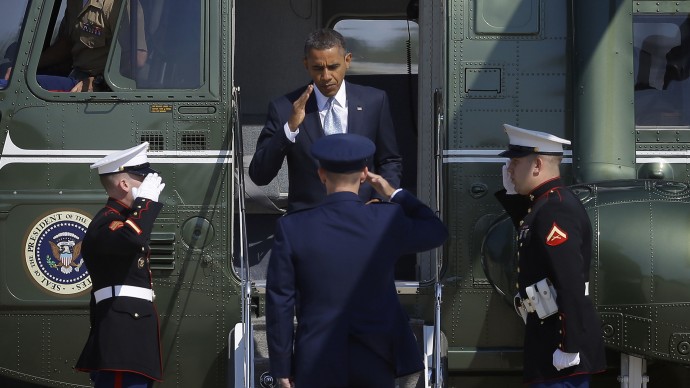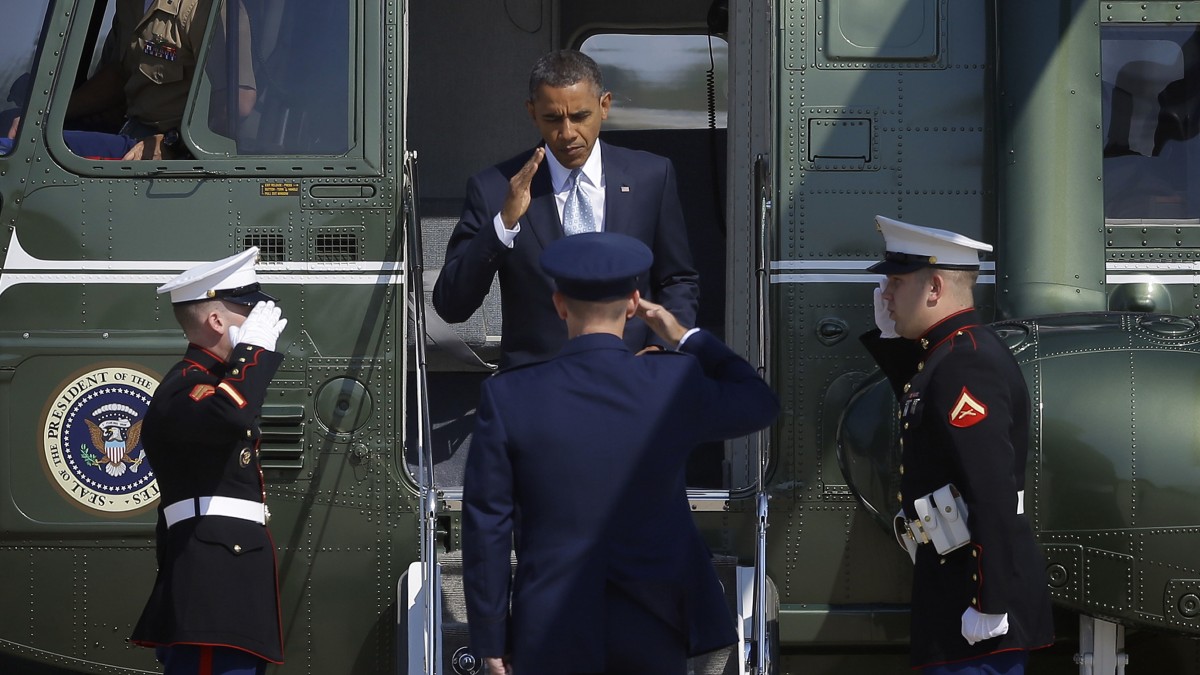
(NEW YORK) MintPress – When President Barack Obama won the Nobel Peace Prize three years ago “for his extraordinary efforts to strengthen international diplomacy and cooperation between peoples,” he joined the ranks of luminaries such as Martin Luther King Jr., Mother Theresa, Aung San Suu Kyi, Elie Wiesel and the14th Dalai Lama.
He is the fourth U.S. president to be awarded the Nobel Peace Prize and the third to become a Nobel laureate while in office.
Obama accepted his award in Oslo, Norway on Dec.10, 2009, with “deep gratitude and great humility.”
The award drew both praise and criticism from world leaders and media figures, and several public commentators had a field day with the news.
The headline over an AP analysis by White House correspondent Jennifer Loven read, “He Won, But For What?” Ana Marie Cox, the author, blogger and Washington correspondent for GQ magazine tweeted, “Apparently Nobel prizes now being awarded to anyone who is not George Bush.”
Kathryn Jean Lopez wrote in the National Review, “I want to buy the world a coke,” while Ezra Klein, a columnist for the Washington Post and Bloomberg as well as a contributor to MSNBC quipped, “Obama also awarded Nobel prize in chemistry. ‘He’s just got great chemistry,’ says Nobel Committee.”
Early days
Obama received the Nobel Prize just nine months after being inaugurated in January 2009. In his first few days in office, he issued executive orders and presidential memoranda directing the U.S. military to develop plans to withdraw troops from Iraq and ordered the shutting down of the Guantanamo Bay detention camp, but Congress prevented the closure by refusing to appropriate the required funds, and it is still open.
In February and March, Vice President Joe Biden and Secretary of State Hillary Rodham Clinton made separate trips overseas to announce a “new era” in U.S. foreign relations with Russia and Europe, using the terms “break” and “reset” to signal major changes from the policies of the previous administration of George W. Bush.
Obama also tried to reach out to Arab leaders by granting his first interview to an Arab cable TV network, Al Arabiya.
On March 19, he released a New Year’s video message to the people and government of Iran, although the Iranian leadership rebuked the move. The next month, though, Obama gave a speech in Ankara, Turkey, which was well received by many Arab governments.
Then, in June 2009, Obama delivered a speech at Cairo University in Egypt calling for “a new beginning” in relations between the Islamic world and the U.S. and promoting Middle East peace. Also that month, in response to the Iranian government’s actions toward protesters following Iran’s presidential election, Obama said: “The violence perpetrated against them is outrageous. We see it and we condemn it.”
In July of that year, while in Moscow, the president responded to a comment by Biden about a possible Israeli military strike on Iran by saying, “We have said directly to the Israelis that it is important to try and resolve this in an international setting in a way that does not create major conflict in the Middle East.”
On Sept. 24, 2009, Obama became the first sitting U.S. president to preside over a meeting of the United Nations Security Council.
Later years
In March 2010, shortly after winning the Peace Prize, Obama took a public stance against plans by the Israeli Prime Minister Benjamin Netanyahu to continue building Jewish housing projects in predominantly Arab neighborhoods of East Jerusalem.
During the same month, he reached an agreement with the administration of Russian President Dmitry Medvedev to replace the 1991 Strategic Arms Reduction Treaty with a new pact reducing the number of long-range nuclear weapons in the arsenals of both countries by about one-third. The New START treaty was signed by Obama and Medvedev in April 2010 and was ratified by the U.S. Senate in December 2010.
Meanwhile, the Obama administration scheduled the withdrawal of combat troops in Iraq to be completed by August 2010, decreasing troops levels from 142,000 while leaving a transitional force of 35,000 to 50,000 in the country until the end of 2011. On Aug. 19, 2010, the last U.S. combat brigade left Iraq. Remaining troops transitioned from combat operations to counter-terrorism and the training, equipping and advising of Iraqi security forces
Later that month, Obama announced that the combat mission in Iraq was over. On Oct. 21, 2011, he said that all U.S. troops would leave Iraq in time to be “home for the holidays.”
The longest war
On the other hand, early in his presidency Obama moved to bolster American military might in Afghanistan. In February 2009, after eight years of war, he announced an increase of 17,000 troops to “stabilize a deteriorating situation in Afghanistan,” an area he said had not received the “strategic attention, direction and resources it urgently requires.”
He replaced the military commander, Gen. David D. McKiernan, with former Special Forces commander Lt. Gen. Stanley A. McChrystal in May 2009, suggesting that McChrystal’s Special Forces experience would help the use of counterinsurgency tactics in the war.
On Dec. 1, 2009, Obama announced the deployment of an additional 30,000 military personnel to Afghanistan. He also proposed to begin troop withdrawals 18 months from that date. All troops are now expected to leave the country by the end of 2014.
In June 2010, Obama replaced replaced McChrystal with David Petraeus after McChrystal’s staff criticized White House personnel in a Vanity Fair article.
Diplomacy in the Middle East
During the initial years of the Obama administration, the U.S. increased military cooperation with Israel, including increased military aid, re-establishment of the U.S.-Israeli Joint Political Military Group and the Defense Policy Advisory Group, and an increase in visits among high-level military officials of both countries.
During the U.N. General Assembly meeting in New York last week, however, Obama declined a meeting with Israeli Prime Minister Benjamin Netanyahu, as he did with newly-elected leaders from the region.
In 2011, the U.S. vetoed a Security Council resolution condemning Israeli settlements, with the United States being the only nation to do so. Yet Obama supports the two-state solution to the Arab–Israeli conflict based on the 1967 borders with land swaps.
Also that year, in March, as forces loyal to Muammar Gadhafi advanced on rebels across Libya, the U.S. Senate unanimously passed a resolution instating a no-fly zone in Libya.
Yet reports came in that Gadhafi’s forces continued shelling Misrata and, on Obama’s orders, the U.S. military took a lead role in air strikes to destroy the Libyan government’s air defense capabilities to protect civilians.
Then, on March 25, by unanimous vote of all of its 28 members, NATO took over leadership of the effort, dubbed Operation Unified Protector. Some members of Congress questioned both Obama’s constitutional authority to order military action as well as the structure and aftermath of the operation.
At about the same time, Obama authorized a “surgical raid” to be conducted by United States Navy SEALs on a compound in Abbottabad, Pakistan where Osama bin Laden was believed to be staying. The operation in May 2011 resulted in the death of bin Laden and the seizure of papers, computer drives and disks tied to al-Qaida.
Ongoing debate
Yet many commentators continue to criticize Obama’s win. The latest to vocalize his views
is comedian Jon Lovitz, who recently tweeted a picture of picture of Obama holding the prize with a caption that reads, “Nobel Peace Prize? You didn’t earn that. Somebody else made that happen.”
The text is a takeoff of a recent quote from Obama that has been widely slammed by his Republican opponents. In a speech, he emphasized his belief that the government is instrumental in helping people achieve success, saying in part, “If you’ve got a business — you didn’t build that. Somebody else made that happen.”
Some have taken the statement as proof that Obama believes the government is responsible for an individual’s success, yet Lovitz’s tweet suggests that Obama has claimed he was fully responsible for his Nobel Prize.
Still, the president has never publicly said that, and in fact, has often acknowledged the people and institutions that have helped him throughout his life.
Executive privilege
Obama himself has acknowledged the criticism. In March 2011, he took a moment during a speech about energy policy to praise a colleague and drop some self-deprecating humor.
“Energy Secretary Steven Chu’s the right guy to do this, he’s got a Nobel prize in physics — he actually deserved his Nobel prize,” Obama said, drawing laughter for his remarks.
On a more serious note, in an interview with CNN from El Salvador that same month, he also addressed the matter. “I’m accustomed to this contradiction of being both a commander-in-chief but also somebody who aspires to peace,” he explained.
The president also defended the mission in Libya, saying that the role of the U.S. had been taken on by his determination to protect its civilians from their leader.
“We’re not invading a country; we are not acting alone,” he said. “We are acting under a mandate issued by the U.N. Security Council.”
The Nobel Committee has also weighed in. “Some people say – and I understand it – ‘Isn’t it premature? Too early?’ Well, I’d say then that it could be too late to respond three years from now,” Thorbeorn Tagland, chairman of the Committee, told the AP at the time the prize was awarded. “It is now that we have the opportunity to respond – all of us.”
The 2012 winner of the Nobel Peace Prize has not yet been announced.


